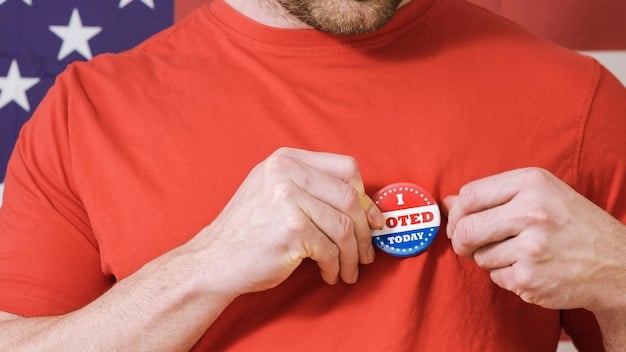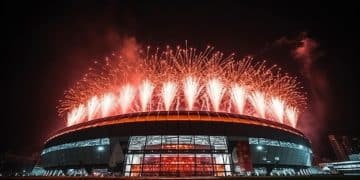World Cup 2026 Volunteer Opportunities: US Resident Guide

Aspiring volunteers in the US eager to participate in the FIFA World Cup 2026 should monitor official FIFA channels for application specifics, as deadlines and requirements will be detailed closer to the event, necessitating proactive engagement and preparedness.
The anticipation for the FIFA World Cup 2026 is building, especially for those in the United States, Canada, and Mexico, preparing to host this monumental event. For many US residents, this presents a unique opportunity not just to watch, but to actively participate. Among the most direct ways to be involved is by becoming a volunteer, a role that offers an unparalleled behind-the-scenes experience. Understanding the intricacies of World Cup 2026 Volunteer Opportunities: Application Deadlines and Requirements for US Residents is crucial for anyone hoping to contribute to the success of this global spectacle.
The Vision for World Cup 2026 Volunteering
The FIFA World Cup 2026 is poised to be an event of unprecedented scale, with 48 teams competing across 16 host cities in three countries. For the United States, this means a significant logistical undertaking, and volunteers will be at the heart of ensuring its smooth operation. The volunteer program is more than just providing assistance; it’s about building a community, fostering international goodwill, and creating a memorable experience for millions of visitors and participants. It offers a chance to be part of history.
The volunteer experience is designed to be comprehensive, offering roles that span a wide array of functions, from logistics and event operations to fan services and media support. FIFA and the host cities will collaborate to create a robust framework that supports volunteers throughout their journey, from application to post-event recognition. This collaborative effort ensures that both the volunteers and the event benefit from a well-structured and engaging program.
The Core Philosophy of World Cup Volunteering
At its heart, the World Cup volunteer program embodies a spirit of service and passion for football. It seeks individuals who are enthusiastic, adaptable, and willing to go the extra mile to make the event a success. The program aims to leave a lasting legacy, not just for the host cities, but also for the volunteers themselves, equipping them with invaluable skills and experiences.
- ⚽️ Community Building: Bringing together people from diverse backgrounds.
- 🤝 Skill Development: Offering practical experience in event management, hospitality, and more.
- 🌟 International Exchange: Facilitating cultural understanding and friendships.
- 🌍 Legacy Creation: Contributing to a historic event and its positive impact.
The commitment asked of volunteers is significant, but the rewards are equally substantial. Imagine being on the ground, witnessing the excitement, and knowing your efforts contributed directly to a World Cup match. It’s an opportunity to create indelible memories and be part of a global team united by a common goal.
Ultimately, the vision for World Cup 2026 volunteering extends beyond the duration of the tournament. It aims to foster a sense of civic pride, encourage participation in large-scale events, and inspire future generations to engage in community service. The volunteers will be the face of the host country, exemplifying its hospitality and dedication.
Key Requirements for US Residents to Volunteer
While the definitive requirements for World Cup 2026 volunteers will be formally announced by FIFA and the local organizing committees, drawing from historical patterns of major sporting events provides a solid framework of what prospective US residents can expect. Generally, these events prioritize a blend of demographic, legal, and personal attributes to ensure a capable and committed volunteer force. Meeting these criteria will be the first step towards an application.
A primary stipulation typically involves age. Volunteers must be at least 18 years old by a specified date prior to the tournament. This ensures that individuals are legally mature enough to handle the responsibilities and work schedules associated with such a large-scale event. It also aligns with labor laws and safety regulations prevalent in the United States concerning adult participation in organized activities.
Essential Eligibility Criteria
Beyond age, there’s an expectation of availability and commitment. Volunteering for the World Cup is not a casual commitment; it requires a significant time investment, often including training sessions, shift work during the tournament, and preparatory meetings. Applicants should anticipate needing to dedicate several days or even weeks around the event dates.
- 🗓️ Availability: Commitment to training and event shifts during June-July 2026.
- 🗣️ Language Proficiency: Fluency in English is typically mandatory; additional languages (especially Spanish or French) are a significant asset.
- 🏃♂️ Physical Capability: Ability to perform duties that may involve standing for long periods, walking long distances, or light lifting, depending on the role.
- 🪪 Legal Status: Must be a US resident with legal working status, if applicable, or the right to volunteer.
Furthermore, applicants will likely undergo background checks. Given the secure nature of a major international event like the World Cup, ensuring the safety and security of participants, staff, and the public is paramount. These checks are standard practice for such events and are typically non-negotiable. Honesty and transparency in the application process regarding personal history are extremely important.
An often-underestimated requirement is a positive attitude and strong interpersonal skills. Volunteers are ambassadors of the event and the host country. Their interactions with visitors, athletes, and other volunteers significantly contribute to the overall atmosphere. A friendly demeanor, problem-solving abilities, and a willingness to collaborate are highly valued traits.

Finally, a genuine interest in sport, particularly football, can be a major plus, though it’s not always a strict requirement for all roles. However, an understanding of the event and its significance can enhance a volunteer’s enthusiasm and effectiveness. While the specific details will be released closer to the application period, preparing to meet these general parameters will position prospective volunteers well.
Application Deadlines and How to Prepare
The exact application deadlines for World Cup 2026 volunteer opportunities have not yet been announced, but based on patterns from previous major sporting events, it is highly probable that the official application portal will open approximately 12 to 18 months before the tournament kicks off in June 2026. This timeframe allows ample opportunity for recruitment, vetting, training, and logistical planning for the vast volunteer force required. Prospective volunteers should mark their calendars for late 2024 or early 2025 as a potential window.
To stay ahead, the most critical advice is to monitor official FIFA channels and the websites of the host cities. FIFA’s main website (FIFA.com) and the official World Cup 2026 host city websites will be the primary sources of information regarding volunteer programs. Signing up for newsletters and official announcements from these bodies will ensure you receive timely updates as soon as they are released.
Strategies for a Successful Application
Preparing for the application process involves more than just waiting for the portal to open. It’s about building a strong profile that stands out. Start by identifying any existing skills or experiences that align with typical volunteer roles. This could include customer service, event management, language skills, first aid, or even specific technical expertise.
- 🌐 Monitor Official Channels: Regularly check FIFA.com and host city websites for announcements.
- 🎯 Identify Your Skills: List out relevant experiences (customer service, languages, event support).
- 📄 Prepare Your Resume/CV: Update it with relevant experiences, even non-professional ones.
- 📧 Sign Up for Alerts: Subscribe to newsletters from FIFA and local organizing committees.
Consider enhancing your profile through additional training or certifications. For example, a basic first-aid certification could make you a more desirable candidate for roles involving public safety. Similarly, if you possess language skills beyond English, seeking a formal assessment or certification might bolster your application. These preparatory steps demonstrate initiative and a serious commitment to volunteering.
Networking can also play a subtle but helpful role. While direct lobbying for a volunteer spot is unlikely, engaging with local sports organizations or community groups that might be involved with pre-tournament events could offer insights or even early opportunities that expose you to similar environmental demands. Building a rapport within volunteer networks can provide valuable tips on the application process and necessary preparations.
Finally, once the application period begins, be prepared to complete the application promptly and thoroughly. These programs often receive a large volume of applications, and early submission, combined with a well-articulated motivation for volunteering, can be advantageous. Your passion for the World Cup and your willingness to contribute should clearly shine through in your application.
Diverse Volunteer Roles and Responsibilities
The FIFA World Cup 2026 will undoubtedly offer a vast array of volunteer roles, each vital to the smooth execution of the tournament. From the moments fans arrive until they depart, volunteers will be integral at every touchpoint. Understanding the spectrum of these roles can help prospective applicants identify positions that best match their skills, interests, and availability, maximizing their chances of being selected and enjoying their volunteer experience.
One major category of roles revolves around fan services and hospitality. These volunteers are often the first point of contact for international visitors, providing directions, answering questions, and generally enhancing the fan experience. This role requires excellent interpersonal skills, patience, and a friendly demeanor. It’s an opportunity to represent the host city and country, leaving a positive impression on global visitors.
Operational and Logistical Support
Another significant area is operational support, which encompasses a wide range of behind-the-scenes duties that keep the event running efficiently. This could involve assisting with accreditation, managing access points, supporting transportation logistics, or helping with equipment distribution. These roles often require a keen eye for detail, organizational skills, and a willingness to work within structured environments.
- 🏟️ Venue Operations: Assisting with signage, spectator flow, and facility management within stadiums.
- ✈️ Airport & Transportation Support: Guiding arrivals and departures, coordinating ground transport.
- 💻 Technology & Accreditation: Supporting IT needs, managing passes and access control systems.
- 🩺 Medical Services Support: Non-medical assistance in first-aid posts, guiding patients.
Roles supporting the media and marketing efforts are also crucial. Volunteers in this domain might assist journalists, support press conferences, help distribute media materials, or even contribute to social media content creation. These positions are ideal for individuals with strong communication skills, an understanding of media operations, or those pursuing careers in related fields.
Furthermore, positions focusing on team and referee services ensure that participants have what they need, from training ground support to accommodation assistance. Medical support roles, while not involving direct medical care for non-qualified individuals, might involve guiding attendees to first-aid stations or helping with general logistical support for medical teams. The diversity of roles ensures that there’s a fit for various skill sets and levels of experience.
Regardless of the specific role, all volunteers will play a part in creating a welcoming and efficient environment. The sheer scale of the World Cup means that every function, no matter how small it seems, contributes to the larger picture of an unforgettable international event. Matching your skills to a role will not only benefit the organization but also enhance your personal experience.
Training and Onboarding for Volunteers
Once selected, World Cup 2026 volunteers will undergo a comprehensive training and onboarding process designed to equip them with the knowledge and skills necessary for their assigned roles. This is not a trivial step; it’s a critical phase that ensures every volunteer understands their responsibilities, the event protocols, and how to effectively contribute to the overall success of the tournament. The specifics of the training will vary depending on the role, but a core curriculum will be universal.
Typically, training begins with a general orientation, often held both online and in-person. This initial phase provides an overview of the FIFA World Cup, its history, the vision for 2026, and the overarching goals of the volunteer program. It’s an opportunity for volunteers to meet sector leaders, understand the organizational structure, and begin to feel part of the larger team.
Components of the Training Program
Following the general orientation, specialized training tailored to specific volunteer roles will commence. For instance, those in fan services might receive extensive training on crowd management, cultural sensitivity, and effective communication strategies. Volunteers in logistics might focus on inventory management systems, transportation schedules, and emergency procedures. This role-specific training ensures that individuals are well-prepared for their day-to-day duties.
- 🆕 General Orientation: Overview of the World Cup, its values, and basic event protocols.
- 📚 Role-Specific Training: Detailed instruction pertinent to assigned duties (e.g., hospitality, logistics, media).
- 🆘 Emergency Preparedness: Protocols for security incidents, medical emergencies, and evacuation procedures.
- 🗣️ Cultural Sensitivity: Guidance on interacting with diverse international visitors and participants.
A significant component of the training will also involve emergency preparedness and security protocols. Given the scale and nature of the World Cup, safety is paramount. Volunteers will be briefed on potential scenarios, evacuation procedures, communication channels during emergencies, and whom to contact for various incidents. This knowledge is vital for ensuring the safety of not just the public, but also the volunteers themselves.
Practical, on-site training sessions are also common, particularly closer to the event dates. This allows volunteers to familiarize themselves with the venues, understand their designated zones, and practice their roles in a simulated environment. These rehearsals are invaluable for identifying any potential issues and building confidence among the volunteer team before the actual matches begin. They also help establish team cohesion and familiarity among team members.
The onboarding process often includes uniform distribution, access pass issuance, and briefings on schedules. Volunteers will receive all necessary credentials and equipment, along with detailed shift plans. Support mechanisms, such as dedicated volunteer centers and team leaders, will also be in place to ensure volunteers feel supported and can address any concerns or questions throughout their service period. This comprehensive approach ensures a well-prepared and effective volunteer workforce.
Benefits of Volunteering at World Cup 2026
Volunteering at the FIFA World Cup 2026 extends far beyond the satisfaction of contributing to a global event. For US residents, it offers a wealth of tangible and intangible benefits that can significantly impact personal and professional development. These advantages range from unique networking opportunities to the acquisition of valuable skills, making the commitment a truly worthwhile endeavor.
One of the most immediate benefits is the unparalleled access and experience. Volunteers get a behind-the-scenes look at the operational complexities of a mega-event, witnessing firsthand the coordination required to host thousands of athletes, officials, and millions of fans. This unique perspective is something money cannot buy and is often remembered as a highlight of the experience.
Professional and Personal Growth
From a professional standpoint, volunteering provides an excellent opportunity for skill development. Depending on the role, individuals can enhance their abilities in areas such as project management, customer service, logistical planning, media relations, and cross-cultural communication. These transferable skills are highly valuable and can be added to resumes, making candidates more attractive to future employers.
- 🤝 Networking Opportunities: Connect with professionals, fellow volunteers, and international visitors.
- 📈 Skill Enhancement: Develop transferable skills in event management, communication, and problem-solving.
- 👨💼 Resume Building: Add a prestigious and unique experience to your professional profile.
- 🌎 Cultural Immersion: Engage with diverse international communities and perspectives.
The networking potential is immense. Volunteers will work alongside people from diverse professional backgrounds, both locally and internationally. This creates opportunities to forge new connections, exchange ideas, and potentially open doors to future collaborations or career opportunities. Building a network within the event and sports industry can be particularly advantageous for those aspiring to work in these fields.

On a personal level, the sense of camaraderie and shared purpose among volunteers is often cited as a deeply rewarding aspect. Being part of a team working towards a common goal, making new friends, and contributing to history fosters a strong sense of community and personal achievement. The pride of being part of such a significant event can be immensely motivating and fulfilling.
Additionally, volunteers typically receive official recognition, such as certificates of appreciation, exclusive merchandise, and sometimes even invitations to special events. These tokens serve as a lasting reminder of their contribution. For many, simply being able to say they were a part of the FIFA World Cup is a source of immense pride. The memories created and the stories shared will last a lifetime, making the volunteer journey an enriching addition to any personal history.
Tips for a Stand-Out Volunteer Application
Securing a volunteer spot for the FIFA World Cup 2026 will be competitive, given the prestige and global appeal of the event. To maximize your chances of success as a US resident, it’s essential to craft an application that truly stands out. While specific requirements will be outlined closer to the application period, leveraging general best practices for large-scale event volunteering can give you a significant edge.
Firstly, begin by articulating your genuine passion for the event and football. While not every role is directly related to the sport itself, demonstrating enthusiasm for the World Cup and its values can differentiate your application. This can be expressed in your cover letter or personal statement, conveying why you want to be part of this particular historical moment.
Highlighting Relevant Skills and Experience
Beyond passion, clearly mapping your skills and experiences to the potential roles is crucial. Don’t just list previous jobs or volunteer gigs; explain how the duties performed in those roles translate directly to the responsibilities of a World Cup volunteer. For example, if you have customer service experience, highlight your ability to resolve conflicts, communicate effectively, and maintain a positive attitude under pressure.
- 💡 Showcase Enthusiasm: Express genuine excitement for the World Cup and its global impact.
- 🎯 Tailor Your Application: Connect your skills directly to anticipated volunteer roles.
- 🗣️ Emphasize Language Skills: Highlight fluency in languages beyond English, if applicable.
- 👍 Demonstrate Adaptability: Show willingness to learn new tasks and work in dynamic environments.
Language proficiency, particularly in Spanish or French given the participating nations, can be a significant advantage, even if not explicitly required for your desired role. Mentioning any level of proficiency can indicate your ability to assist diverse international visitors, which is a highly valued trait in such global events. Cultural awareness and sensitivity should also be subtly conveyed.
Be prepared to demonstrate flexibility and reliability. Major events require volunteers who can adapt to changing circumstances, handle unexpected challenges, and adhere to strict schedules. Providing examples from your past where you successfully navigated dynamic environments or demonstrated strong commitment can bolster your application. Highlighting your ability to work both independently and as part of a team is also beneficial.
Finally, ensure your application is meticulously proofread and free of errors. A professional and polished application reflects attention to detail and seriousness about the opportunity. If interviews are part of the selection process, be ready to articulate your motivations verbally, provide specific examples of your skills, and confirm your availability for the duration of the tournament, including training periods. A well-prepared and authentic application will always have the greatest impact.
| Key Point | Brief Description |
|---|---|
| 🗓️ Application Timeline | Anticipate applications opening late 2024 / early 2025. Stay updated via official FIFA channels. |
| ✅ Key Requirements | Must be 18+, US resident, committed, and ready for background checks. |
| 🤹 Diverse Roles | Opportunities range from fan services to logistics and media support. |
| 🌟 Benefits | Gain unique experience, skills, networking, and cultural exchange. |
Frequently Asked Questions About World Cup 2026 Volunteering
Official application deadlines for World Cup 2026 volunteer opportunities are typically announced by FIFA and the local organizing committees approximately 12 to 18 months before the tournament. This means prospective US residents should anticipate announcements surfacing in late 2024 or early 2025. It’s crucial to monitor the official FIFA website and host city platforms for the most accurate and up-to-date information regarding the application window.
While specific requirements will be confirmed, typically volunteers for major FIFA events must be at least 18 years old by a specified date prior to the tournament commencing. For US residents, having legal status to volunteer within the United States is paramount. A valid US ID and potentially a background check will likely be part of the verification process, ensuring eligibility and security for the event.
The World Cup will offer a wide array of roles, including but not limited to fan services, logistics, venue operations, media support, and transportation. Preferred skills often include excellent communication, problem-solving, teamwork, and a positive attitude. Fluency in multiple languages, especially Spanish or French, can be a significant advantage, demonstrating adaptability and cultural sensitivity essential for an international event.
Yes, selected volunteers will undergo comprehensive training. This typically involves general orientation sessions covering event overview and values, followed by role-specific training for assigned duties. Training may also include emergency preparedness, cultural sensitivity, and on-site venue familiarization. The aim is to ensure all volunteers are well-equipped with the necessary knowledge and skills to perform their tasks effectively and safely.
Volunteering offers unique benefits, including unparalleled behind-the-scenes access to a global sporting event and the opportunity to contribute to history. Volunteers gain valuable professional skills transferable to various careers, expand their network by collaborating with diverse individuals, and immerse themselves in a rich cultural exchange. It also fosters a strong sense of community, purpose, and personal pride in being part of such a significant international spectacle.
Conclusion
The anticipation for the FIFA World Cup 2026 offers US residents a once-in-a-lifetime opportunity to join a global movement as a volunteer. While specific application deadlines and detailed requirements are forthcoming, proactive preparation and monitoring of official channels are paramount. By understanding the general criteria, refining relevant skills, and demonstrating genuine enthusiasm, aspiring volunteers can position themselves favorably to play a crucial role in staging this historic event. The experience promises not only to be personally enriching but also to connect individuals with a worldwide community united by the love of football and the spirit of service.





